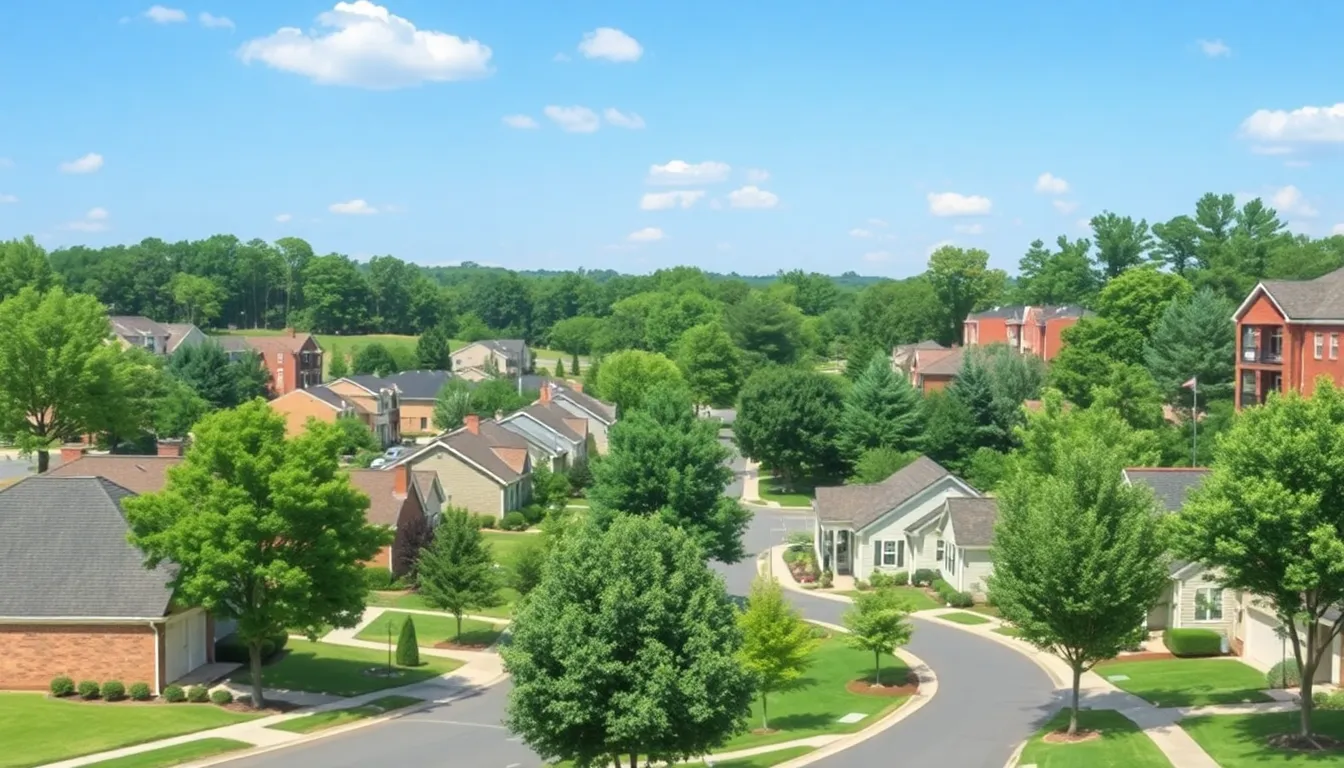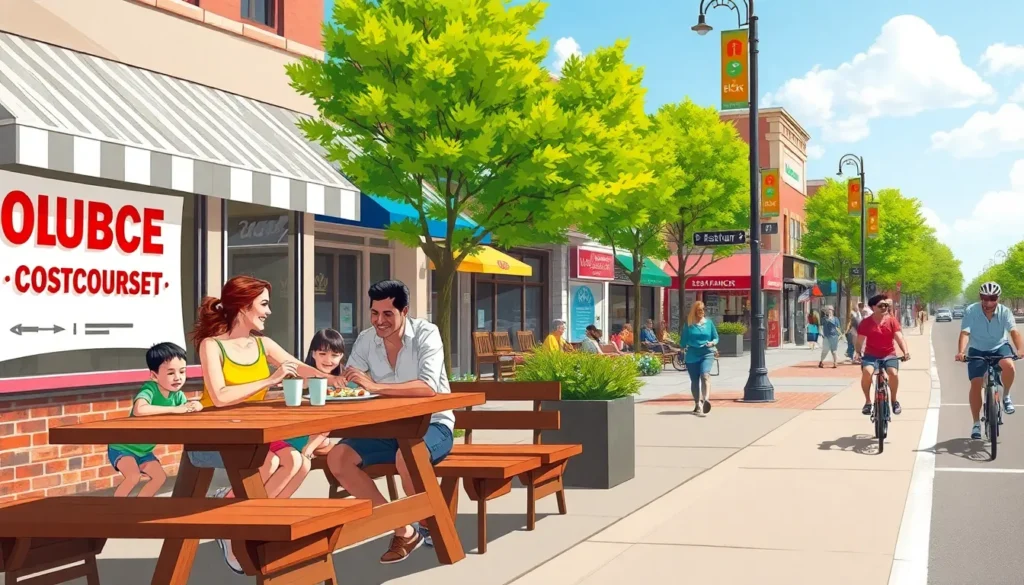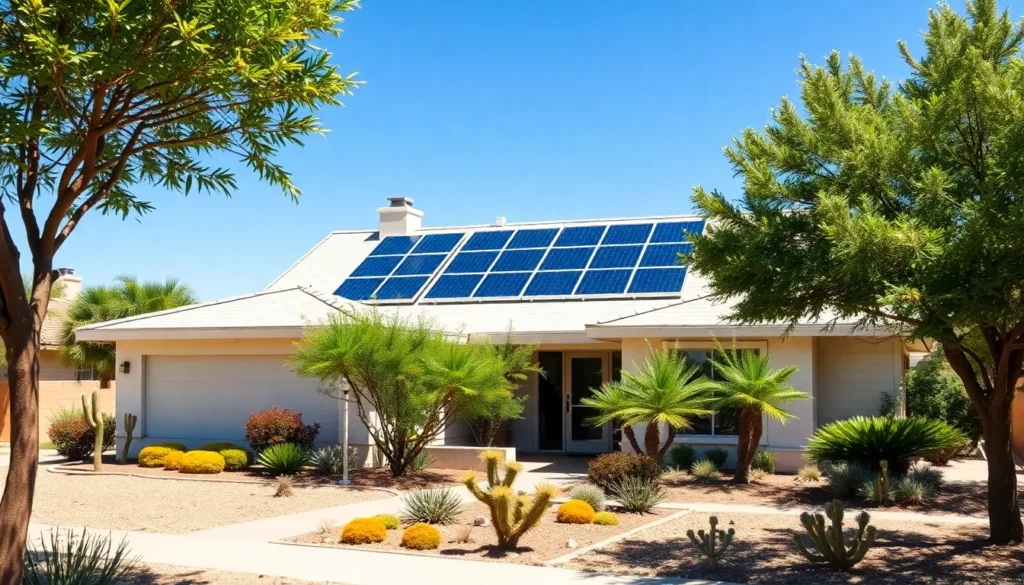Raleigh, NC, isn’t just the capital of North Carolina; it’s a hidden gem where Southern charm meets modern convenience. With a cost of living that won’t make your wallet cry, this city offers a delightful blend of affordability and quality of life. Imagine living in a place where you can enjoy delicious barbecue without sacrificing your budget—yes, please!
Overview of Cost of Living in Raleigh, NC
Raleigh, NC, offers an attractive cost of living, appealing to many families and professionals. Housing expenses represent a significant portion of monthly budgets, with the median home price around $310,000, according to Zillow. Renters find decent options, too, as the average monthly rent for a one-bedroom apartment hovers near $1,400 in the city center.
Utility costs in Raleigh remain relatively low, averaging $170 monthly for electricity, heating, and water. Transportation expenses also accommodate diverse budgets. Public transit options, like buses, provide affordable commuting alternatives, while gasoline prices align closely with the national average.
Food costs vary, yet residents often enjoy dining out without overspending. The average meal at a mid-range restaurant costs roughly $15, which allows for regular enjoyment of local cuisine. Grocery prices remain reasonable as well, with a monthly grocery bill for a family of four around $800.
Healthcare expenses contribute to overall affordability, reflecting a lower-than-average cost for medical services in the area. Residents can expect costs 5% below the national average, making healthcare accessible.
Educational costs for families add another dimension. Public schools in Raleigh boast favorable ratings, contributing to property values in desirable neighborhoods. Tuition for private schools typically ranges from $9,000 to $25,000 annually, depending on the institution.
Overall, Raleigh’s cost of living facilitates a balanced lifestyle. Couples and families can thrive in a community valuing quality of life, access to amenities, and affordability.
Housing Costs

Housing costs in Raleigh, NC, play a crucial role in determining the overall expense of living in the area. With a blend of rental and purchase options, potential residents find multiple choices catering to various budgets.
Rent Prices
Average rent in Raleigh stands at $1,400 for a one-bedroom apartment in the city center. Many neighborhoods offer diverse rental options that range from urban apartments to suburban homes. Renting a two-bedroom apartment typically costs around $1,800. Prices vary depending on amenities and location, making it key for renters to research before committing. Overall, Raleigh’s rental market remains accessible compared to many other cities.
Home Purchase Prices
The median home price in Raleigh hovers around $310,000. Buyers encounter a competitive market that features a variety of homes, including single-family residences and townhouses. Many factors influence the pricing, including neighborhood appeal and proximity to amenities. First-time homebuyers find that favorable mortgage rates and local programs enhance buying opportunities. The city’s growing popularity contributes to steady appreciation in property values, making homeownership an attractive investment.
Transportation Expenses
Transportation costs in Raleigh, NC, contribute significantly to overall living expenses. These costs vary based on personal commuting choices and public transit availability.
Average Commute Costs
Average commute costs in Raleigh amount to approximately $300 monthly for drivers. Gasoline prices typically hover around $3.00 per gallon. Vehicle maintenance and insurance further add to monthly expenses, with insurance averaging $110 monthly. For commuters using rideshare services, the average fare ranges from $15 to $30 for trips within the city.
Public Transportation Options
Public transportation options in Raleigh include buses operated by GoRaleigh. A one-way bus fare costs $2, while a monthly pass is available for $60. Riders benefit from over 20 routes covering key city areas. Commuting by bus provides an affordable alternative to driving, especially for those who prefer not to manage parking fees and vehicle upkeep. Additionally, Raleigh offers bike-sharing programs, further enhancing transportation choices within the city.
Utilities and Monthly Bills
Residents in Raleigh enjoy manageable utility costs that contribute to the overall affordability of living in the city.
Electricity and Water Costs
Electricity rates typically range from $100 to $150 monthly, depending on usage. Water bills average around $50 per month, providing access to clean and reliable services. Seasonal changes can affect these costs, especially with temperature extremes influencing cooling and heating needs. Many households find that energy efficiency measures help reduce electricity expenses while maintaining comfort. The majority of utility providers ensure competitive pricing, keeping these essential services within budget for residents.
Internet and Phone Expenses
Internet costs in Raleigh hover around $60 monthly, offering various plans from multiple providers. Residents often choose packages that meet their streaming and browsing needs without excessive fees. Cell phone plans usually range from $40 to $80 monthly, depending on the chosen carrier and features. Many options exist, from budget-friendly to premium services, allowing individuals to select plans that suit their lifestyles. Additionally, bundled services featuring internet and phone options create savings opportunities for many households.
Grocery and Food Prices
Raleigh’s grocery and food prices remain competitive, making it easier for families to manage their budgets. The average monthly grocery bill for a family of four hovers around $800. Essential items such as milk can cost about $3.50 per gallon, while bread typically runs at $2.50 per loaf. Fresh produce remains accessible, with apples priced around $1.50 per pound and tomatoes at $2.00 per pound. These costs allow residents to enjoy a balanced diet without financial strain.
Average Grocery Costs
Average grocery costs in Raleigh reflect the city’s affordability. Families commonly spend about $800 monthly on essentials. Pricing for staple items is generally reasonable, with eggs costing roughly $2.00 per dozen and chicken breast at about $3.00 per pound. Specialty items, including organic products, may carry premium prices, yet affordable options remain abundant.
Dining Out Expenses
Dining out in Raleigh offers various choices for all budgets. Average meal costs at mid-range restaurants settle around $15 per person. Fast food options present greater savings, averaging about $8 per meal. Residents enjoy local specialties, including barbecue, at reasonable prices. For those who prefer fine dining, several upscale options feature meals closer to $30. Overall, Raleigh’s dining scene ensures flavorful experiences without excessive spending.
Healthcare Costs
Healthcare costs in Raleigh, NC, remain lower than the national average, making medical services more accessible for residents. Access to quality healthcare is essential, and Raleigh provides various facilities, from primary care physicians to specialized medical services.
Medical Services
Medical services in Raleigh feature multiple hospitals, clinics, and urgent care options. Major hospitals like WakeMed and UNC Health offer comprehensive care. Access to specialists is also available, ensuring residents receive quality treatment in various healthcare fields. The average cost for a routine doctor’s visit ranges from $100 to $200, depending on the provider. Patients often find that preventative care, such as vaccinations and annual check-ups, is essential for maintaining long-term health.
Health Insurance
Health insurance options in Raleigh vary widely, with several plans catering to different needs. On average, individual premiums for health insurance range from $300 to $400 monthly. Employers often provide coverage as part of their benefits, helping to reduce out-of-pocket costs. Government programs like Medicaid and Medicare assist eligible residents with health expenses. Additionally, many individuals in Raleigh utilize Health Savings Accounts (HSAs) to save for qualified medical expenses, providing further financial relief.
Raleigh, NC, stands out as an attractive option for those seeking a blend of affordability and quality of life. With reasonable housing costs and accessible utilities, residents can enjoy a comfortable lifestyle without breaking the bank. The city’s diverse dining options and competitive grocery prices make it easy for families to manage their budgets while savoring local flavors.
Healthcare services are also more affordable than in many other regions, ensuring that residents have access to necessary medical care. As Raleigh continues to grow, it maintains its charm and appeal, making it a desirable place to live for individuals and families alike.













